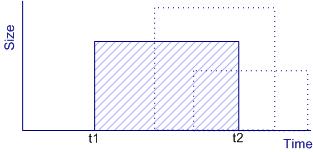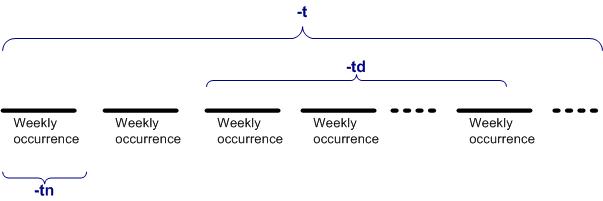Use brsvmod to modify advance reservations
Modify start time (postpone or move closer)
Modify the duration of the reservation window (and thus the end time)
Modify the slot numbers required by the reservation (add or remove slots with hosts)
Modify the host or host group list (add or remove hosts or host groups)

Replace the user or user group list or add or remove users or user groups

Add hosts by resource requirement (-R)
Modify the reservation type (open or closed)
Disable the specified occurrences of a recurring reservation

The shadowed box shows the original reservation
Time means the time window of the reservation
t1 is the begin time of the reservation
t2 is the end time of the reservation
The reservation size means the resources that are reserved, such as hosts (slots) or host groups
Use brsvmod to shift, extend, or reduce the time window horizontally; grow or shrink the size vertically.
Extend the duration
brsvadd -n 1024 -m hostA -u user1 -b "6:0" -e "8:0"
Reservation "user1#0" is created brsvmod -e "+60" user1#0
Reservation "user1#0" is modified Add hosts to a reservation allocation
Use brsvmod to add hosts and slots on hosts into the original advance reservation allocation. The hosts can be local to the cluster or hosts leased from remote clusters.
 Adding a host without -n reserves
all available hosts or slots on the host that are not already reserved
by other reservations. You can specify the number of slots to be added
from the host list specified with -n, but -n cannot
be used alone. -m can be used alone if no host group
is specified in the list. You cannot specify -R without
with -n.
Adding a host without -n reserves
all available hosts or slots on the host that are not already reserved
by other reservations. You can specify the number of slots to be added
from the host list specified with -n, but -n cannot
be used alone. -m can be used alone if no host group
is specified in the list. You cannot specify -R without
with -n. 
 The specified number of
units (slots or hosts) must be less than or equal to the available
number of slots for the hosts or hosts themselves.
The specified number of
units (slots or hosts) must be less than or equal to the available
number of slots for the hosts or hosts themselves. 
 Only
hosts can be added (-m) to a system reservation.
Slots cannot be added (-n) to a system reservation.
Only
hosts can be added (-m) to a system reservation.
Slots cannot be added (-n) to a system reservation. 
Reserve 2 more slots from hostA:
brsvmod addhost -n2 -m "hostA"Reserve 4 slots in total from hostA and hostB:
brsvmod addhost -n4 -m "hostA hostB"Reserve 4 more slots from any Linux hosts:
brsvmod addhost -n4 -R"type==linux"Reserve 4 more slots from any Linux hosts in the host group hostgroup1:
brsvmod addhost -n4 -m "hostgroup1" -R "type==linux"Reserve all available slots from hostA and hostB:
brsvmod addhost -m "hostA hostB"
brsvadd -n 1024 -m "hostA hostB" -g groupA -t "3:0:0-3:3:0"
Reservation "groupA#0" is created brsvs
RSVID TYPE USER NCPUS RSV_HOSTS TIME_WINDOW
groupA#0 user groupA 0/1024 hostA:0/256 3:3:0-3:3:0 *
hostB:0/768brsvmod addhost -n 256 -m "hostA" groupA#0
Reservation "groupA#0" is modified
brsvmod rmhost -n 256 -m "hostB" groupA#0
Reservation "groupA#0" is modifiedRemove hosts from a reservation allocation
Use brsvmod rmhost to remove hosts or slots on hosts from the original reservation allocation. You must specify either -n or -m. Use -n to specify the number of slots to be released from the host. Removing a host without -n releases all reserved slots on the host. The slot specification must be less than or equal to the actual reserved slot number of the host.
Remove 4 reserved slots from hostA
brsvmod rmhost -n 4 -m "hostA"Remove 4 slots in total from hostA and hostB.
brsvmod rmhost -n 4 -m "hostA hostB"Release reserved hostA and hostB.
brsvmod rmhost -m "hostA hostB"Remove 4 slots from current reservation allocation.
brsvmod rmhost -n 4
brsvmod rmhost -n 2 -m "hostA" system#1brsvs
RSVID TYPE USER NCPUS RSV_HOSTS TIME_WINDOW
user1_1 user user1 3/4 hostA:2/2 1/24/12/2-1/24/13/0
hostB:1/2brsvmod rmhost -m hostB user1_1
brsvmod rmhost -n 1 -m hostB user1_1brsvmod rmhost -n 2 user1_1
brsvmod rmhost -m hostA user1_1
brsvmod rmhost -n 1 -m hostA user1_1
brsvmod rmhost -n 2 -m hostB user1_1Modify closed reservations
brsvadd -o -n 1024 -m hostA -u user1 -b 6:0 -e 8:0
Reservation "user1#0" is created brsvmod -on user1#0
Reservation "user1#0" is modified Disable specified occurrences for recurring reservations
Use brsvmod disable to disable specified periods, or instances, of a recurring advance reservation.
Recurring reservations may repeat either on a daily cycle or a weekly cycle. For daily reservations, the instances of the reservation that occur on disabled days will be inactive. Jobs using the reservation are not dispatched during on those disabled days. Other reservations are permitted to use slots of the reservation on those days. For overnight reservations (active from 11 p.m. to 9 a.m. daily), if the reservation is disabled on the starting day of an instance, the reservation is disabled for the whole of that instance.
For a weekly reservation, if the reservation is disabled on the start date of an instance of the reservation then the reservation is disabled for the entire instance. For example, for a weekly reservation with time window from 9 a.m. Wednesday to 10 p.m. Friday, in one particular week, the reservation is disabled on Thursday, then the instance of the reservation remains active for that week. However, if the same reservation is disabled for the Wednesday of the week, then the reservation is disabled for the week.

Once a reservation is disabled for a period, it cannot be enabled again; that is, the disabled periods remain fixed. Before a reservation is disabled, you are prompted to confirm whether to continue disabling the reservation. Use the -f option to silently force the command to run without prompting for confirmation, for example, to allow for automating disabling reservations from a script.
Reservation "user1#0" is created
brsvadd -n 4 -m hostA -u user1 -t "6:0-8:0" brsvmod -disable -td "2007:12:1-2007:12:10" user1#0
Reservation "user1#0" is modified brsvadd -n 4 -m hostA -u user1 -b "2007:12:1:6:0" -e "2007:12:1:8:0"
Reservation "user1#2" is created Change users and user groups
Use brsvmod -u, brsvmod adduser, or brsvmod rmuser to change the users or user groups that are able to submit jobs with the advance reservation.
Jobs submitted by the original user or user group to the reservation still belong to the reservation and scheduled as advance reservation jobs, but new submitted jobs from the removed user or user group cannot use the reservation any longer.
brun
An advance reservation job dispatched with brun is still subject to run windows and suspending conditions of the advance reservation for the job. The job must finish running before the time window of a closed reservation expires. Extending or shrinking a closed advance reservation duration prolongs or shortens lifetime of a brun job.
bslots
bslots displays a snapshot of the slots currently not in use by parallel jobs or advance reservations. If the hosts or duration of an advance reservation is modified, bslots recalculates and displays the available slots and available run time accordingly.
How advance reservation modifications interact
Modification... |
Disable |
Begin time |
End Time |
Add Hosts |
Rm Hosts |
User/ Usergroup |
open/ closed |
Pre cmd |
Post cmd |
||
|---|---|---|---|---|---|---|---|---|---|---|---|
One-time |
Active |
No |
No |
Yes |
Yes |
Yes |
Yes |
Yes |
Yes |
Yes |
|
Inactive |
No |
Yes |
Yes |
Yes |
Yes |
Yes |
Yes |
Yes |
Yes |
||
Recurring |
Occurrences |
All |
No |
Yes |
Yes |
Yes |
Yes |
Yes |
Yes |
Yes |
Yes |
Specified |
Yes |
No |
No |
No |
No |
No |
No |
No |
No |
||
Active instance |
No |
No |
No |
No |
No |
No |
No |
No |
No |
Where: "Yes" means the modification is supported; otherwise, "No" is marked. For example, all modifications are acceptable in the case that the advance reservation is inactive (and not disabled).